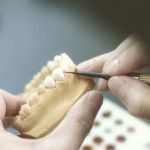
What to Expect During a Dental Cleaning Appointment
- 1. Why Dental Cleaning Is Important
- 2. Before Your Dental Cleaning Appointment
- 3. Steps Involved in a Dental Cleaning
- 4. Common Questions During a Dental Cleaning
- 5. After Your Dental Cleaning Appointment
- 6. Real-Life Experiences and Benefits
- 7. Final Thoughts and Preparing for Future Appointments
1. Why Dental Cleaning Is Important
Routine dental cleaning appointments are essential for maintaining your oral health. While brushing and flossing at home are vital, a professional cleaning removes plaque and tartar buildup that can cause cavities, gum disease, and other dental issues. Regular cleanings help prevent future problems and ensure your teeth and gums stay healthy. It's also an opportunity for your dentist to check for any early signs of oral health issues.
2. Before Your Dental Cleaning Appointment
Before your dental cleaning, your dentist or hygienist will likely ask you a few questions about your oral hygiene habits, medical history, and any symptoms you may be experiencing. It's essential to be honest about your habits—such as smoking, drinking sugary beverages, or having a sensitive mouth—so the cleaning process can be tailored to your needs. If you have any specific concerns, such as gum bleeding or sensitivity, be sure to bring them up so your dental team can address them.
3. Steps Involved in a Dental Cleaning
A typical dental cleaning involves several key steps:
- Physical Examination: The dentist or hygienist will begin by visually inspecting your teeth and gums for any signs of problems, such as cavities, plaque buildup, or gum disease.
- Scaling: Using a small dental instrument, the hygienist will carefully remove plaque and tartar from your teeth, especially around the gum line. This is important as plaque can harden into tartar, which cannot be removed with regular brushing.
- Polishing: After scaling, your teeth will be polished to remove any remaining surface stains and to smooth the enamel, making it more difficult for plaque to adhere.
- Flossing: The hygienist will floss between your teeth to remove any debris that may have been missed during the cleaning process.
- Fluoride Treatment (Optional): Some dentists may apply a fluoride treatment to strengthen your teeth and provide additional protection against cavities.
4. Common Questions During a Dental Cleaning
It's normal to have questions during your dental cleaning appointment. Some of the most common questions include:
- Will it hurt? Most people find that dental cleanings are generally painless, though you might experience some discomfort if you have sensitive gums or plaque buildup.
- How long will the cleaning take? A standard cleaning typically takes around 30 minutes to an hour, depending on how much buildup needs to be removed and the overall health of your teeth and gums.
- How often should I get a cleaning? Generally, it is recommended to have a professional cleaning every six months, though some individuals may need more frequent visits depending on their oral health.
5. After Your Dental Cleaning Appointment
Once your cleaning is complete, you may experience a smooth, fresh feeling in your mouth. Your teeth may appear brighter, and your gums may feel slightly tender, but this is normal. If you had any issues like gum bleeding or plaque buildup, the dentist will likely provide you with additional instructions to help maintain your oral health at home. This may include a reminder to brush and floss regularly or advice on using specific oral care products designed for sensitive teeth or gums.
6. Real-Life Experiences and Benefits
Real-life examples highlight the importance of dental cleanings. Take, for instance, Jane, who had not visited a dentist in over two years. After her appointment, she was surprised at how much plaque had built up, and her hygienist was able to thoroughly clean her teeth, leaving them looking much whiter. Jane also learned about early signs of gum disease, which allowed her to take preventive steps to protect her teeth in the future. Similarly, Mike, who regularly kept up with cleanings, noticed a significant improvement in his overall oral health, including fresher breath and healthier gums.
7. Final Thoughts and Preparing for Future Appointments
Regular dental cleaning appointments are a cornerstone of good oral hygiene and health. While the process may seem intimidating at first, knowing what to expect can help you feel more at ease. It's a quick and relatively painless way to ensure your teeth stay healthy, your gums stay strong, and you’re free from tooth decay or gum disease. If you're due for a cleaning, schedule your appointment today and take control of your oral health for a bright, confident smile.
To make your dental cleaning experience even easier, consider investing in some high-quality oral care products, such as electric toothbrushes or fluoride toothpaste, to maintain the cleanliness and health of your teeth between visits. A good cleaning routine will complement your professional cleanings and keep your smile in top shape.







 Dr. Sam Saleh4.0 (37 review)
Dr. Sam Saleh4.0 (37 review) Cooley Smiles Everett4.0 (795 review)
Cooley Smiles Everett4.0 (795 review) Gulf Coast Advanced Dentistry4.0 (317 review)
Gulf Coast Advanced Dentistry4.0 (317 review) Dentist Of Wyckoff NJ0.0 (0 review)
Dentist Of Wyckoff NJ0.0 (0 review) Midjersey Family Dentistry4.0 (86 review)
Midjersey Family Dentistry4.0 (86 review) West Nyack Dental2.0 (85 review)
West Nyack Dental2.0 (85 review) The Importance of Oral Health Education During Pregnancy for a Healthy Pregnancy
The Importance of Oral Health Education During Pregnancy for a Healthy Pregnancy Best Tips for Brushing Your Teeth Properly for Healthy Gums: Essential Techniques for Oral Health
Best Tips for Brushing Your Teeth Properly for Healthy Gums: Essential Techniques for Oral Health Why Skipping Dental Checkups Can Lead to Bigger Oral Health Problems
Why Skipping Dental Checkups Can Lead to Bigger Oral Health Problems Advantages of Porcelain Dental Restorations
Advantages of Porcelain Dental Restorations How Can Diabetes Cause Tooth and Gum Problems? Preventing and Managing Oral Health Issues
How Can Diabetes Cause Tooth and Gum Problems? Preventing and Managing Oral Health Issues Healthy Habits for Promoting Good Oral Health and Hygiene: Tips for a Healthy Smile
Healthy Habits for Promoting Good Oral Health and Hygiene: Tips for a Healthy Smile